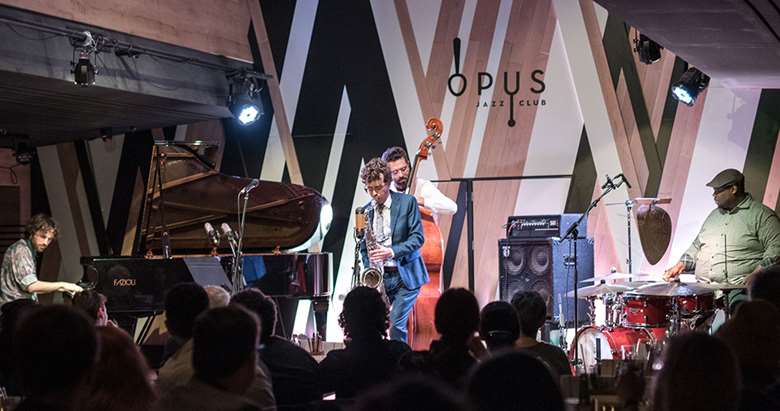Sleeping Dragons: Oded Tzur Quartet Stun With Silence At Opus
Martin Longley
Thursday, February 27, 2020
Israeli saxophonist presages forthcoming ECM offering in Budapest

This was the 10th date of an intense European tour, with virtually no rest-days, and zero UK appearances. The sign of artist visas to come? Israeli tenor saxophonist Oded Tzur has been a New York City resident for almost a decade, and had played at the Jazz Standard club the night before this tour began. Tzur has just released his debut for the ECM label, a suitably quietened meditation called Here Be Dragons. These fire-breathers are mostly slumbering.
The quartet last played at the Opus Jazz Club almost exactly two years ago, when they were promoting Tzur’s first two discs on the Enja label. This Budapest joint actually has a similar vibration to NYC’s Jazz Standard, in terms of intimacy and sonic cosseting, though its colour scheme is beige wooden rather than darkened crimson. Opus is part of the Budapest Music Center, which also houses a full-sized concert hall, a research library and record label. It’s just a five minute amble from the Danube.
Opus serves food, and diners are encouraged to consume their fodder an hour before the show begins. This was even more desired than usual, as the quartet opened with near silence, very slowly increasing their presence in the room, savouring each tender micro-nudge of the volume dial. Each member was poised, studied, alert and concentrated, standing at the Tord Gustavsen end of a tranquil glade.
Tzur’s long, sustained notes made him a tenorman with a flute sound, which might be explained by his studies with the Indian bamboo-breathing bansuri master Hariprasad Chaurasia. As is often the case, artists whose ECM works are calmly restrained on record tend towards an enlivening process once released onto the touring stage. Therefore, the quartet incrementally increased their speed, bringing an edge of friction to their articulation. Johnathan Blake started to set up rickety circulations around his drumheads, ticking fast across his low-slung cymbal array.
Doing his best to smooth out every potential tenor burr, Tzur finds a pure runnel of tone. Blake and bassman Petros Klampanis developed an out-of-time existence, separated from the steady croon of their leader, working out of dub reggae and funk skeletons, before Tzur became roadhouse bluesy, soloing like he’s riding a horse.
The second set opened with a Blake solo drum salvo, so dominant that we could barely discern the supporting pulse of Tzur, Klampanis and pianist Nitai Hershkovits. During the first set, the tenor was imbued with a flute character, but now it had ascended to the theremin realms, searching for an almost disembodied melodic personality. The rapturously received set was followed by an encore of ‘Afro Blue’, Blake driving hard from the get-go, Tzur reminding all that he can handle being a traditional tough tenor, if required.